A few days ago, the Seattlepi.com's Joel Connelly was scolding Mayor McGinn for his "gratuitous personal insult directed at Gov. Chris Gregoire." At a press conference, McGinn said, "I don't believe we can trust the governor" to protect Seattle against cost overruns from the deep-bore tunnel project. The governor's spokesman Cory Curtis said that Gregoire simply doesn't believe overruns are a threat to Seattle.
That would be news to anyone who's spoken with the state legislature. The latest lawmaker to go on record vowing to make Seattle pay for any excess costs is Rep. Larry Seaquist, a Democrat from Gig Harbor. Seaquist told the Seattlepi.com, "I will be among those who make damn sure that deal stands in place. We bought our own bridge, you can buy your own tunnel" (a reference to funding of the second Tacoma Narrows Bridge).
Gov. Gregoire has mounted lawyerly arguments against the possibility of cost overruns, saying things that sound like there's little possibility of such a thing ever happening, and heaping scorn on McGinn as a foot-dragger. "What could cause a cost overrun? Delay," said the governor, despite the fact that, when it suits WSDOT, a year's extension to the project's timeline is spun as bringing costs down.
Gregoire has also called the specific provision "unenforceable," which may be technically true. But it's also disingenuous. The Legislature is perfectly capable of writing an enforceable provision, and Sen. Jim Kastama (another Democrat) went on record over a year ago to say, if costs exceed the budgeted amount, Seattle will pay. Note that these are both Democrats, and that recent Republican wins have cut into the Democratic majority in both House and Senate....
Photo: Flickr pool member nate.gowdy
From arts and advocacy groups, to homeless encampments, the pressure is on to find a secure niche in the new economy. Earlier this week, Mayor McGinn wrote on his blog that the fire department was putting new restrictions on the use of Building 30 at Magnuson Park, reducing the number of events that can be held there to four from over 30.
A wide range of groups rent the hangar for larger public events--Friends of the Library Book Sale, the Arboretum Foundation Plant Sale, Best of the Northwest Craft Show--so the Mayor is suggesting that the city use $8.5 million in "MOHAI money" for a renovation of the space:
Parks estimates that, for $8.5 million, they can renovate building 30 to keep the hangar open for community events and can renovate the west wing for artist work space. This will bring in almost half a million dollars in annual revenue to Parks that they would not otherwise have. It will protect the $121,000 in event space rentals and will generate an additional $350,000 from work space rentals in the west wing.
The groups in question certainly agree. The vast majority of the post's 150 comments cheer the idea, which I think makes it the single most popular idea the Mayor has had since taking office. Now the public opinion screws will be turned on the City Council, who may find themselves forced to agree with the Mayor on something--or not.
The McGinn administration's other big idea, to find a "permanent" place for the city's roving homeless camps to stay, is not nearly as crowd-pleasing, but McGinn has at least left tonier Seattle neighborhoods relieved with his selection of SoDo's former Sunny Jim factory as a possible camp site. (Ballard is having trouble getting its mind around a homeless hygiene station because it will attract homeless people.)
Currently, the homeless of these tent cities face regular eviction, and it's one of the great shames of Seattle that the situation has continued for so long--the moral poverty of those who despise the homeless on a variety of grounds, or simply refuse to spend the time considering hard realities, far outdoing the physical poverty of the homeless....
 "Do you want to go FASTER?" courtesy of our Flickr pool member Great_Beyond
"Do you want to go FASTER?" courtesy of our Flickr pool member Great_Beyond
Reprinted with permission from Community Broadband Networks.
If Seattle moves forward on the Community Fiber Network it has been considering, it will be the largest such network in the nation. However, as we recently noted, progress has been slow. Reclaim the Media recently noted progress toward publicly owned fiber in Edmonds and asked why Seattle is stuck in the mud on the issue.
The City's "Seattle Jobs Plan" devotes a significant mention of a publicly owned fiber network as a smart investment:
Seattle’s economic prosperity, its ability to deploy effective public safety systems, and its determination to reduce gridlock and greenhouse gases are increasingly dependent on its communication systems. Currently, the communication systems serving Seattle businesses and residents are controlled by a few private companies, using older technology. With a lack of competition, there is little incentive to invest in more innovative technologies.
Although some of Seattle’s larger institutions have migrated to their own fiber networks, these types of networks are unavailable to residents and Seattle’s small businesses. Multiple surveys indicate that 70% of Seattle households want to see more telecommunications competition. A recent study listed global cities with the fastest broadband connections; not a single U.S. city was listed in the top 20. A network of municipal fiber optic cables would instantly put Seattle at the top of the list of U.S. cities capable of supporting next-generation, data-intensive businesses, making it a potential hub for a number of fast-growing industries.
But the network requires a significant amount of planning:...
Technically--technically--the news is that the Coalition of City Labor Unions have agreed to a new contract "in which thousands of city workers will accept lower cost-of-living increases for three years," says the City of Seattle. But given that the city is facing a $67 million deficit, and this move saves only $2.1 million, the upshot is that Mayor McGinn will be scrounging for every dollar from parking, permits, and licenses that he can find.
For the record, I am pro-union in general principle. Union jobs remain one of the few ways people can achieve a relatively secure middle-class lifestyle. Unions are a last bulwark against the corporate profit-taking that can decimate working communities.
But I choke a bit when, after what's clearly the mostly vicious economic downturn since the Great Depression, the Coalition of City Labor Unions "shares the pain" via a tiny raise, and (since they were promised a two-percent annual cost-of-living increase) it's characterized as accepting grim reality:
With today's announcement, 8,500 of the city's 10,600 employees, or about 80 percent, are taking some kind of reduction in pay....
(more)
 I want to cover a few different, but related, story strands here, so bear with me. Typically with news, you dive in with laser-like precision, but here the goal is to step back from the news just far enough to see a pattern, which is not just that in Seattle race relations remain contentious, but that insisting upon fairness and equality will marginalize you.
I want to cover a few different, but related, story strands here, so bear with me. Typically with news, you dive in with laser-like precision, but here the goal is to step back from the news just far enough to see a pattern, which is not just that in Seattle race relations remain contentious, but that insisting upon fairness and equality will marginalize you.
The lesson is, Shut up and take what you can get.
You'll learn about Sable Verity's firing from Tabor 100 (an entity "committed to economic power, educational excellence and social equity for African-Americans"), and the Seattle Ethics and Elections Commission report (pdf attached) that chronicles a substantial amount of back-pedaling and wishing it would all go away.
You'll also hear what got Sable Verity into trouble with the Mayor's Office--her crusade for equal police protection in south Seattle--contrasted with something funny that the City Council's Tim Burgess said the other day, that:
You just need to remember, where are the centers that they’re cutting? They tend to be, except for Alki, they’re in the north end of the city. You can see a pattern here of public policy decisions that the mayor has been making that, I’m not going to question his motives, but they are dividing our city....
(more)
Readers of The SunBreak will have noted we have been relatively quiet on the subject of Mayor McGinn's proposed budget for next year. (Vote for your cranky cost-saving measures here.) I simply have not been able to get my arms around the beast, outside of general outlines.
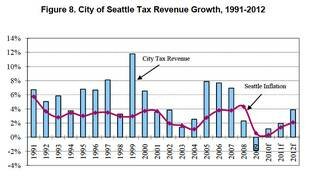 One delineation to make is that this budget crisis is a revenue problem, not a wasteful city spending problem. In 2008, the general fund budget was $925 million, last year it was $905 million, and this iteration is $888 million. Meanwhile, the city's four main revenue streams--taxes on utilities, sales, businesses, and property--growing at six to eight percent annually in the boom years, fell off a cliff in 2009, entering negative territory.
One delineation to make is that this budget crisis is a revenue problem, not a wasteful city spending problem. In 2008, the general fund budget was $925 million, last year it was $905 million, and this iteration is $888 million. Meanwhile, the city's four main revenue streams--taxes on utilities, sales, businesses, and property--growing at six to eight percent annually in the boom years, fell off a cliff in 2009, entering negative territory.
Another bright, shining line is the difference between the general fund and the total city budget, which last totals over $3.8 billion dollars. That is, almost 80 percent of what the city spends annually lies outside the general operating budget. Instead over 200 city staff are being fired. That's why Ken Schramm, no mayoral ally, says suck it up when it comes to parking rate increases. There ain't no easy way out.
Still, Mayor McGinn says he welcomes fierce argument over his budget choices, and Blogging Georgetown has responded with a critique of cutting library hours and services at a time when they are needed more than ever. "The old man" has graciously allowed us to republish his broadside:
The mayoral candidate that allegedly lavished such love on South Park during the election is proposing cutting librarians from the South Park branch of the Seattle Public libraries. According to the [Seattle] Times, the budget that he submitted to the city council included cuts from SPL, including "Delridge, Fremont, International District/Chinatown, Madrona-Sally Goldmark, Montlake, New Holly, South Park and Wallingford — [which would] would lose their librarians. The buildings would be open 35 hours a week for collections, computer access and holds-pickup."...
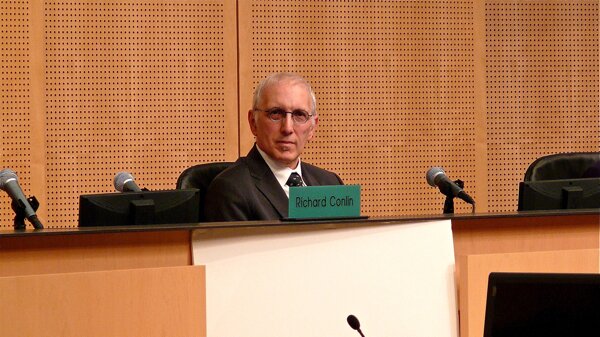 City Councilmember Nick Licata
City Councilmember Nick Licata
I can already see Nick Licata's Christmas card to Mayor McGinn: "Thanks for making me look middle-of-the-road." The City Council's Licata has long been--years before President Obama's election--Seattle's "socialist" in city government, often ending up on the wrong end of the teeter-totter from everyone else on the Council.
With McGinn assuming the loose lefty cannon mantle, Licata has been free to act as the voice of reason. Today, he's brokered a compromise to quell the contretemps arising from the funding of MOHAI's move to the Lake Union Armory. (The details are spelled out in his Urban Politics newsletter, which will be up shortly.)
With statesmanlike restraint, Licata chose to focus on the more proximate needs of the two parties at odds: Mayor McGinn needs to find cash to balance the budget, and MOHAI needs all the help it can get to survive its move. What Licata rather cunningly realized is that the two cash crunches don't coincide in time. His compromise means the city will still pay MOHAI the agreed upon $7 million, but not during the next budget year.
Restructuring the release of the $40 million that MOHAI will receive from the State can achieve these two objectives. The City will retain $8.5 million during 2011 and 2012 and then pass that amount onto MOHAI after we receive our share of the land proceeds in 2013 or later. The result is that we have real cash to spend on one-time needs, like summer youth employment, library collections, and food banks that we otherwise would not have....
(more)
 In his introductory remarks at last week's Sustainable Industries Economic Forum, Mayor McGinn seemed to forget the word of the day was optimism, asking the audience had they all read Jared Diamond's Collapse.
In his introductory remarks at last week's Sustainable Industries Economic Forum, Mayor McGinn seemed to forget the word of the day was optimism, asking the audience had they all read Jared Diamond's Collapse.
McGinn referenced the "Who cut down the last tree?" question that is always asked about Easter Island--summing up hindsight's incredulity at completely using up a renewable resource.
As to how that happens, "we're getting a clue right now," he added, complaining that we set environmental and sustainability goals, and then ignore them when it comes to large transportation projects.
To be fair, McGinn was also preparing for a city budget address that called for laying off over 200 city employees, so some gloominess was perhaps inevitable. (In a later Q&A, David Williams, CEO of ShoreBank Pacific, noted that the economy was "still deteriorating" and that he expected it to take five to seven years for it to pull out of its slump.)
 Cameron Sinclair, Architecture for Humanity
Cameron Sinclair, Architecture for Humanity
Then Cameron Sinclair--co-founder and "eternal optimist" at Architecture for Humanity--gave a keynote was supposed to be the antidote to any wet-blanketry, but if so, it came in the form of a tough-love caplet. Sinclair, now in his late 30s, is a "socially conscious architect" who won a TED prize in 2006 for his work, and used the prize money to fund what he calls "open source architecture," where people can share their ideas about camel-back clinics, among other things....
Mayor McGinn is giving a public budget address today at noon at the Rainier Beach Community Center. It won't be particularly cheery; the city has a $67 million general fund deficit for 2011, and that's after substantial cuts have already been made throughout the recession (which, we remind you, is over).
"Considerable input from residents is needed to develop a budget that best reflects the needs of our city," says the City Council, so they are inviting you to vote online or attend one of these three public hearings in North, South or Central Seattle:
- Wednesday, September 29
Northgate Community Center Gym
10510 5th Ave NE, 98125
5:30 p.m. Public Hearing (5 p.m. sign-in) - Wednesday, October 13
The Brockey Center at South Seattle Community College
6000 16th Avenue SW, 98106
5:30 p.m. Public Hearing (5 p.m. sign-in) - Tuesday, October 26
Seattle City Hall Council Chambers, 2nd floor
600 Fourth Avenue, 98104
5:30 p.m. Public Hearing (5 p.m. sign-in)
 City Council President Richard Conlin is confident he did the right thing. Also, here is a picture of a Babydoll sheep.
City Council President Richard Conlin is confident he did the right thing. Also, here is a picture of a Babydoll sheep.
It's probably no surprise to learn, as Publicola reports, that a supermajority of the City Council thinks having a mayor is "more of a guideline." (Possibly related: It's Turn In Your Old Drugs Day.)
While you're over there, read the Council's Tim Burgess on why he was all, "Yeah, send Bishop Conlin!" which crystallizes the kind of project-capture thinking that places going forward with the tunnel above respecting the city's charter. Quote of the week goes to Mike O'Brien, who notes that, "Only in Seattle would we have a coup over who signs an environmental-impact statement."
Late Friday, regulators seized Arlington's North County Bank, and sold it to Whidbey Island Bank; bad development and construction loans ended up costing the FDIC (and you and me and everyone we know) almost $73 million dollars, about 25 percent of the bank's total value.
In the latest on the multiple fatal shootings in West Seattle, the 60-year-old grandmother is said to have had a history of mental illness, and--more troublingly--she may have been taking medication erratically. Many people are not aware that the kinds of drugs used now to treat depression and schizophrenia can have horrendous side-effects if suddenly discontinued....
 Council President Richard Conlin
Council President Richard Conlin
Yesterday at 5:38 p.m. I got an email from the City Council announcing that "Seattle City Council President confirms next phase in Alaskan Way Viaduct environmental review,"and that Council President had signed the supplemental draft environmental impact statement (SDEIS) so the city could "remain as co-lead on the [...] project."
The problem with this "git-r-done" mentality is that it doesn't follow the established process and contravenes the city charter. The official signatory for the SDEIS would be Peter Hahn, the chief of Seattle's Department of Transportation. And Hahn reports to Mayor McGinn, who had told him not to sign yet--not the Council. The City Council has no authority in the matter, an upset Mayor McGinn told The Stranger last night.
The City Council's predictably defensive email goes on to explain that the deadline for signing was yesterday, and nothing was happening:
The Director of Seattle Department of Transportation (SDOT) had a scheduled appointment with the state to complete this task. This date has been known to all parties since early July. Yesterday, the Mayor requested more time to review the SDEIS.
It may sound like the deep-bore tunnel SDEIS has been sitting around since July, but as Publicola reports, the city was given just a few days to review it and hand back:...
I know, the recession is over. But here's the first line of a Seattlepi.com article this morning: "King County Executive Dow Constantine announced Tuesday morning that his proposed budget would eliminate all general fund support for human services." It would also cut ten percent of the sheriff's budget.
That's in response to the county's $60 million deficit. Seattle's projected deficit is now $67 million. The state of Washington, $520 million. Reports Bloomberg: "Washington has reduced spending by $5.1 billion in the past three years, Gregoire said last month. Yesterday, she said the state faces a deficit of almost $4.5 billion in the two-year budget cycle that begins in July." The cuts will come from social services, corrections, and community colleges.
KIRO quotes Arun Raha, the state's chief economist, saying, "In Washington, the job recovery this time around has been slower than in any of the previous four recessions. If you compound that with the fact that the hole we're in is the largest in living memory, you begin to comprehend the magnitude of the problem."
The irony, of course, is that the city, county, and state don't spend that much, proportionally, on social services to begin with. When Constantine zeroes out social services spending--sorry, battered women and anyone who has been raped--he's addressed about one-third of the problem.
But the state is pushing ahead with a plan for a larger replacement of SR 520's floating bridge--work is underway, despite there being $2 billion in funding missing from the $4.65 billion project. (How much larger? "The current SR 520 is 60 ft. wide through Foster Island in the Arboretum. The plan calls for an 133 ft. wide structure," wrote Mayor McGinn in a letter to a group protesting the new bridge's size.)...
Two weeks ago, I wrote about "Mayor McGinn's No Good, Very Bad Week," sensing that both his shakedown of MOHAI and deflection of the John T. Williams shooting were going to dog him, in tandem, for some time.
Yesterday, the same day the City Council overruled the Mayor's attempt to withhold $7 million in city assistance for MOHAI's move to Lake Union, and a group of protesters marched on City Hall, unmollified by Chief Diaz's musical-chairs reorganization in response to the killing of Williams. They sang McGinn a song, reports the Seattle Times, "intended to be medicine for his spirit."
The net result is that the Los Angeles Times has gratefully taken a break from reporting on LAPD abuses to cover Seattle's "turmoil over police-involved shootings," and the Mayor is faced with the option of a veto that the Council can easily override.
The MOHAI muddle, despite the Mayor's valiant attempts to play the fiscal conservatism card, is gaining little traction. Carl Marquardt, McGinn's legal advisor and not, despite what you may think, an unemployed collection agent, posted a rationale to the Mayor's blog that includes the assertion, "Given that MOHAI already has $80 million...," which, if you think $80 million refers to money in the bank, is untrue. What MOHAI has is $20 million in donations, a lot of promises, and a large neon "R." Be sure to read the comment in response to Marquardt's post....
Mayor McGinn announced that he'd talked the unions representing city employees into letting go of their two-percent COLA; instead they get 0.6 percent. The city's projected deficit for 2010-12 has grown by $11 million, to $67 million, since April. That kind of pressure has led the city to blackmailpressure MOHAI into giving up relocation funds won from the state, with MOHAI reaching DEFCON 1 ("We'll close, we swear it!") in short order.
Boeing got local-source religion. Microsoft worked on cementing their image as the Evil Empire. Amazon may have leaked Office for Mac 2011's ship date. Starbucks decided drive-through customers were really thirsty.
Cliff Mass says the only question is how strong our La Niña winter will be--cold and wet, or colder and snowier. While the Howard Hanson Dam situation has improved, "Now is not the time to relax," says King County Council's Julia Patterson. Wet weather isn't good news for residents of Redmond's mold-infested Riverwalk condos, but stay tuned--I hear the cavalry may be coming.
Around the neighborhoods, Capitol Hill residents learned they have deer and a start-up incubator. TechFlash took a tour of Belltown's PopCap Games. Eastlake's Floating Homes tour is Sunday, Sept. 12. "Seattle’s Landmarks Preservation Board voted to nominate the community-center building and steam plant at the 580-unit Yesler Terrace public-housing project for landmark designation."...
Several months ago, writes the Seattle Chamber's Christine Donegan, Seattle employers issued a joint appeal to Mayor McGinn and City Council to avoid raising taxes to balance the 2010 and 2011 budgets. As a follow up, twenty-two business organizations have issued a letter to the mayor and council with specific suggestions for balancing the budget without negatively impacting employers or essential city services.
 Mayor Mike McGinn, introducing The Maldives at Bumbershoot
Mayor Mike McGinn, introducing The Maldives at Bumbershoot
Dear Mayor McGinn,
In April, over two dozen representatives of Seattle employers wrote to urge you to refrain from increasing existing taxes and proposing new taxes to balance the City’s 2010 and 2011 budgets. We believe that burdening employers with additional taxes will slow economic recovery in Seattle. As a follow up to that letter, we write to offer specific suggestions for balancing the City’s 2011 budget that will preserve jobs and critical City services.
As you are well aware, the City of Seattle faces a projected $67 million shortfall between planned expenditures and anticipated revenues in 2011, with $11 million less in revenues than previously predicted. However, the City is projected to collect more General Fund revenue in 2010 than was collected in 2009 and this trend is anticipated to continue through 2012.
Between the year 2001 and 2011, General Fund revenues will have grown by 45 percent, 18 percent when adjusting for inflation. The City’s budget shortfall is not driven by decreasing revenues, but rather as a result of expenses that are increasing at a rate greater than revenues and a rate greater than Seattle’s Consumer Price Index (CPI)....
The news about the Native American man who was shot to death after being found wood-carving in public continues to "develop," as they say. Now it is not clear that he approached the officer threateningly or otherwise, and his family says he was deaf in one ear.
The Seattle Times says Mayor McGinn, "despite several controversial police incidents this year" is confident in his choice of Police Chief Diaz.
"I think Chief Diaz is the right man for the job," McGinn is quoted saying, which has overtones of "Heckuva job, Brownie," coming the same week as King County prosecutors decided that a police officer who told an innocent Latino man he was going to "beat the fucking Mexican piss" out of him was not guilty of a hate crime. The city attorney could still file charges against Detective Shandy Cobane for misdemeanor assault, further endearing himself to the SPD.
McGinn's political deafness has instigated a completely avoidable kerfluffle with MOHAI. Yesterday the Slog reported that the city was making a grab for state funds allocated for MOHAI's SR 520-prompted move from its Montlake location to the South Lake Union Armory.
After directing the museum to negotiate on its own for state funds, estimated to be around $15 million, the city's cartoon eyes exploded from its face when MOHAI came back with $40 million. Quoth Carl Marquardt, lead attorney for the mayor’s office: "This is not a time for any one community organization to be taking all that it can get, while others go without."...
"As of late last year, only 28 percent of small businesses were using bank loans, the lowest rate since 1993," notes the Seattle Jobs Plan, unveiled yesterday by Mayor McGinn.
A chunk of the $50 million in business financing that the city plans to distribute within an 18-month window will go to start-ups and small- and medium-sized businesses looking for loans to help them invest in operations or expand.
Millions more in tax exempt stimulus bonds and tax credits are targeted at large businesses, with a priority given for "projects that create or retain permanent jobs, increase the availability of goods, and serve as an anchor for future economic development in low-income communities."
It's a plan that seems to include the kitchen sink--job training and preparation for college is in there ($2 million), interim parking lots near light rail stations, street food vendors, a city-owned broadband network expanded to homes and businesses, urban farming, and energy-efficient retrofitting ($26 million).
Totaling it all up, the city expects to create around 10,000 jobs in the next few years, reports Seattlepi.com, while it's not really on the hook for much of the financing: "roughly $70 million for business loans and tax credits come from new federal funds and leveraged local dollars from partnerships."...
 Thanks to our Flickr pool's shawnmebo for illustrating that Belltown can be beautiful.
Thanks to our Flickr pool's shawnmebo for illustrating that Belltown can be beautiful.
Last night Mayor McGinn and I'm-official-now Police Chief John Diaz had some squishy "news" to report in the battle to reclaim Belltown from drunken douchenozzles and menacing assmittens. A month and a half in, the pair claimed their Late Night Public Safety Initiative has "paid some huge dividends."
The Seattlepi.com quotes Chief Diaz saying, "We've stopped at least two shootings that I know of that were this close to turning into something very serious, we were able to stop the individuals."
For balance, the Seattle Times notes one woman complained that a morning walk to the store included "a pimp and a group of prostitutes, a drug dealer waiting for a buyer and a homeless man who was masturbating in a doorway."
Belltownpeople attended the public safety meeting, and notes that besides the increased police presence, Belltown will see once-a-week foot patrols, new LED streetlights, a drug-dealer and mentally unstable diversion program (which needs funding), and faster cleanup on Aisle 4, thanks to a CleanScapes pilot project....
Once again, if you want up-to-the-minute coverage of Seattle City Council doings, you've got to bookmark Publicola. They're looking into the Council's proposal to create a transportation benefit district (to assess a $20 annual vehicle fee for transportation improvements that SDOT's leaky budget can't handle). So far Publicola has four or five TBD posts up to...none from anyone else.
Ironically, last year the council repealed a $25 "head tax" that raised $4.5 million each year for transportation improvements, even though SDOT was already facing a deficit. Eight months later, it's time for a new tax to fill the budget hole left by the tax they repealed.
Let's begin at the very beginning: A transportation benefit district (TBD) can be set up by a city or county, creating an independent taxing district for the sole purpose of transportation funding. It can draw revenue from property, sales, and use taxes, and from annual vehicle fees. (Up to $20, vehicle fees don't require a public vote; Lake Forest Park, Edmonds, Des Moines, Olympia, Prosser, and Shoreline have already instituted the $20 yearly fee.)
The council's transportation committee chairman, Tom Rasmussen, proposed the TBD, reports Publicola, who characterize it as an "end run" around Mayor McGinn's transportation plans. In theory, this would raise $6.8 million yearly that the council would collaborate with the Mayor on disbursing....
I was thinking the other day about the poor state of the Obama Administration and how they'd managed to get so much done and yet only lose ground in the process. The problem, as I see it, is the difference between strategy and tactics when it applies to a military campaign.
Strategy is the overall scope of your battle plan. You will take that hill, then push on to the city below. Tactics are the decisions you make in battle. How will you deploy your troops? How will you send them up the hill? Should you use airpower or artillery?
Obama has a master strategy here--fix a whole bunch of problems that have needed fixing for a while, and fix them permanently. The problem is that politics is entirely about tactics, the daily ebb and flow of the battle. And they're getting outmaneuvered on all sides by the political Right, which is fewer in numbers and shoots themselves in the foot every chance they get, but has managed to keep the Obama Administration so harried they fired a USDA executive last week without stopping to consider the story's origin or veracity.
What does this have to do with Mayor McGinn though? Well, he has the same problem. He has a strategy, but he lacks the tactics to get it done, especially in the face of a City Council emboldened by having a political novice in the executive's chair.
Think about his continual sputtering about the Viaduct. He does have a strategy, and it's not a bad one. He's pulling from the playbook of Fabius Maximus, the great Roman general who was maligned for his strategy against Hannibal. Fabius knew that Hannibal was a tactical genius: At Trasimene Lake, the Carthaginians slaughtered a far larger Roman army because Hannibal used the landscape and surprise to force the Romans out of their battle plan, rendering classical Roman tactics completely useless. Fabius knew Rome could not fight Hannibal's war....
The tunnel's southern approach, or, "Acres of Asphalt"
This week, two consultants gave briefings on the deep-bore tunnel planned to replace the Alaskan Way Viaduct: John Newby, P.E., hired by Seattle's City Council, and Dr. Thom L. Neff, hired by Mayor McGinn (video here). Neither man said it would be easy, and neither cared to back up Gov. Gregoire's claim that there will be no cost overruns period.
But apparently it was not within the scope of their inquiry to assess how worthwhile the project is, given the risks. What is the bang for the multi-billion-dollar buck? How does this project's cost/benefit compare with other transportation projects facing the state? Crosscut wants a tunnel vote, but as much as I am dubious about the tunnel project, and despite writing about it for months, I still don't have the information needed for a baseline comparison.
Some very risky projects are worth it. Some aren't. I still maintain that Seattle's decade-long deadlock on the Viaduct's replacement simply indicates that a truly fair, useful, simple solution hasn't been arrived at--largely because leadership insists on "replacing" the Viaduct, rather than better serving the different populations who rely on it. Instead, we're offered a 1.7-mile underground bypass estimated to cost almost $2 billion before anything goes wrong.
"When things go seriously wrong with urban tunnels, the consequences can be significant, leading to long delays, large cost overruns, and extensive 3rd party damages," says Newby's report. Publicola clarifies that--just so there's no confusion--the City Council was informed that there's a 40 percent chance of cost overruns on the $1.96 billion tunnel itself, though the odds incline toward a total of not more than $2.25 billion.
Newby certainly knows firsthand the risks of tunneling; his firm CDM are geotechnical consultants on King County's plagued Brightwater sewage conveyance project. (Here they are discussing in advance how you need to have options besides rescue shafts, given the expense.) "Seattle area glacially consolidated soils have caused significant wear to TBM cutterheads and tools," his report notes. ("Significant" as in "irreparable in situ," in one case that springs to mind. Options? "As of May 1, we have no way to remove it and are still working on a plan," said King County's project manager.)...
It's hard not to take it as an omen that while I was covering the Mayor's announcement of the Seattle Nightlife Initiative at the Century Ballroom last night, someone rummaged through my bike's seat bag and walked off with a a) rag, b) patch kit, and c) front light. All in front of about 30 people standing in line for Molly Moon's ice cream. (In fairness, you don't want to lose your place in that line.) It's my second bike-related theft this summer, after nothing at all over the past five years.
Which, anecdotally, is a way of saying that the furor that produced this Nightlife Initiative--the punitive crackdowns and nightclub stings of the Nickels/Carr era--has been overtaken by recessionary events (unless you personally live next door to a problem club). There are bigger fish to fry, and there's no money to fund any major new effort.
So, nightlife is not as top-of-mind as night deaths. The first question Mayor McGinn took after his presentation was whether this initiative would address violence in Belltown. McGinn responded by saying the Public Safety Initiative was really the tool for that; the nightlife proposal was designed more to deal with neighborhood conflicts with nightspots over nuisance issues like noise complaints or boisterous closing-time crowds.
The Nightlife Initiative [pdf] at this point, he said, was a way of taking this "balanced approach" out to the community, now that the Seattle Nightlife Association has been reassured the city isn't out to get them. There's an online survey where Seattle residents can weigh in about its eight pillars elements:...
Mayor McGinn has handed off a Memorandum of Agreement (between Seattle and the state on the $4.2-billion Alaskan Way Viaduct and Seawall Replacement project) to the City Council. It's probably most remarkable for the fact that neither the Council nor the state seem inclined to read, let alone agree, with its "third way" option. Wrote McGinn in a letter to the Council:
Today I am sending the negotiated agreements between the City and the State, together with some new language for your consideration. This language, which we have included as paragraph 2.11 of the master SDOT agreement, proposes what I call the "third way," and it provides us with a path forward to complete the agreement.
In short, this new contract language would stipulate that Seattle’s agreement to go forward will not take effect unless and until the State amends state law to clarify that the State is responsible for all project funding including cost overruns.
This seems a pro forma move by McGinn. The Council has signaled--mightily--that it has absolutely no problem with the cost overrun provision, and has the numbers to override McGinn's paragraph 2.11. Publicola reports that McGinn didn't bother to discuss his revision with the Council before sending it over.
Council President Richard Conlin, shown laughing and talking with a lobbyist for developers like Vulcan (at an event at Vulcan's Discovery Center), told the Seattle Times an interview over the weekend: "If cost overruns take place, then we'll have to figure it out."
Seattle Police Chief John Diaz
This morning, Mayor McGinn announced interim police chief John Diaz would be taking over the position permanently. Diaz--a veteran with the department who began his SPD service in 1980--remarked that his selection sent a powerful message to the rank and file that someone who started as a patrol officer could work his or her way to the top. [UPDATE: Chief Diaz's full statement here.]McGinn began his remarks by saying that six months ago, Chief Diaz might not have been his first pick, but that through his experience working with Diaz, and seeing his response to the challenges the Seattle Police Department has faced, he felt sure Diaz was the best choice: "The issue here was who was best prepared to deal with the issues of public safety in the city." McGinn said another factor was the budget, and whether the new chief's policing strategy took into account doing more with less.
The press scrum at the announcement focused its questions on the department's sometimes testy relations with the NAACP and on whether Diaz represented the status quo. Diaz responded that the SPD is known nationally for its progressive policing, and that, yes, the SPD had work to do improving its image in minority communities.
In retrospect, Publicola had it right. A few days ago, McGinn and Diaz appeared together to announce a high-profile policing response to the recent spate of Belltown violence.
Asked whether Diaz's place at his side today indicated that he had made up his mind, McGinn responded, "We will have an announcement when we have an announcement."
 This segment is on East John St., just before Broadway.
This segment is on East John St., just before Broadway.
Last week, the Mayor and Council member Tom Rasmussen added another chapter to the endless sparring over tunnel cost overruns, and the Council's Tim Burgess announced that it was time to consider an all-out ban on plastic grocery bags. Earlier, in mid-May, the Council committed Seattle to an Arizona boycott. You wouldn't think, with all the cost overruns debate and the getting tough on panhandlers and plastic bags and Arizona, that there was anything more pressing to be done. So I have collected five photographs I'd like them to take a look at.
I have a short bicycle ride, five to ten minutes, across Capitol Hill to my office. This morning I stopped to take photos of the larger potholes on my route. (Parts of 14th Ave. E. are all potholes, but they're smaller in size.) My point is, these are photos of convenience; I didn't stop if traffic was coming, or if the pothole was on the far side of the road. Any of these, if I hit them right, might send me over the handlebars into traffic.
I don't believe the Seattle Department of Transportation is studiously ignoring Capitol Hill--everywhere I go around Seattle I see similar signs of disrepair. There is an SDOT pothole report hotline (206-684-7623, also online), but it's like playing whack-a-mole. The repairs rarely last for long. Even repaved streets don't seem to last for long, especially where there's heavy bus traffic. (I'm not blaming buses--this would suggest to me that the streets aren't being built to withstand heavy bus traffic in the first place.)
In 2006, Seattle voters passed the Bridging the Gap levy, a nine-year, $365-million transportation maintenance and improvements project specifically to catch up on deferred road maintenance. That is in addition to what is already budgeted, of course. Here is photographic evidence of just how well that's working. ...

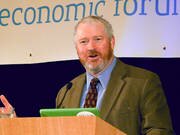
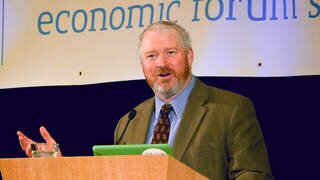

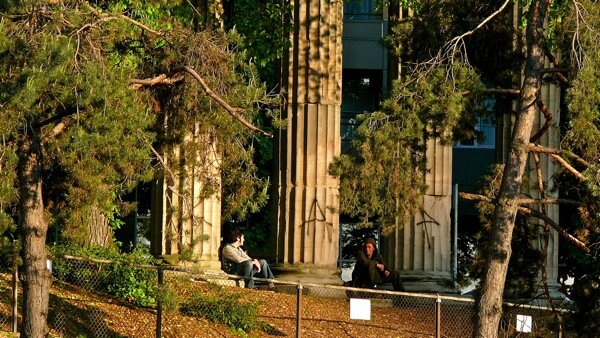



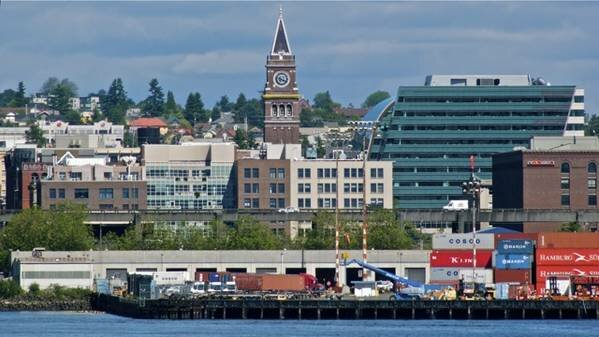

Most Recent Comments